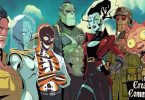You might say teen movies today don’t compare to the ones of the 80s and early 90s. These days everyone is so hypersensitive to stereotypes, homophobia, and male orientated teen comedies it’s ridiculous. Now, Molly Ringwald is criticizing the movies that made her famous.
Molly Ringwald, the red haired beauty of the 80s and star of some of John Hughes most successful films has decided to have a #MeToo moment of reflection. She points out the misogynistic and racist aspects of the 80s and how teen films were made to satisfy young boys coming of age. Read on to get the tea spilling from Mrs Ringwald…
 CelebNMovies247.com finds Molly Ringwald open letter of reflection quite interesting especially since we were one of the teenage boys growing up in the 80s.
CelebNMovies247.com finds Molly Ringwald open letter of reflection quite interesting especially since we were one of the teenage boys growing up in the 80s.
However we disagree with Molly Ringwald‘s criticism of the movies she starred in. We love John Hughes movies but what everyone is forgetting is that Sixteen Candles, The Breakfast Club, and Pretty In Pink of which Molly Ringwald starred were taken from Hughes days growing up.
We see Molly Ringwald’s point about teen comedies of the 80s in general being appalling in their depiction of women, but that was the era. Male based teen comedies like License to Drive, Weird Science, Porky’s and Fast Times at Ridgemount High. That era of film was a golden era for John Hughes, his most successful movies were based from a male perspective just like Home Alone.
John Hughes films are classics, so depicting them as sexism films towards women is unacceptable. We get the #MeToo movement, but it’s sad that everyone feels the need to use films like Sixteen Candles, Breakfast Club and Pretty In Pink as examples of racism and sexism.

Courtesy of Universal Pictures.
When it comes to Molly’s point of few we respect it, but isn’t becoming a bit much to knock the movies that made her famous?
Molly Ringwald makes a valid point about horror films of the 70s and 80s, but have they changed? The black person is always killed first (racist), the promiscuous (THOTS) are taken out next, and if there is a gay person, they’re number three in line of killings. Now, where is that NOT racist, stereotypical or offensive to the gay community.
She writes:
The teen horror flicks that flourished in the seventies and eighties had them getting murdered: if you were young, attractive, and sexually active, your chances of making it to the end were basically nil (a trope spoofed, years later, by the Scream franchise). The successful teen comedies of the period, such as Animal House and Porky’s were written by men for boys; the few women in them were either nymphomaniacs or battleaxes. (The stout female coach in Porky’s” is named Balbricker.) The boys are perverts, as one-dimensional as their female counterparts, but with more screen time.” She noted that even one directed by a woman, Amy Heckerling’s Fast Times at Ridgemont High, “still made room for a young male’s fantasy of the actress Phoebe Cates striding topless in a soft-porny sprinkler mist.
Molly continues to rip apart Sixteen Candles when it comes to the geek hooking up with Jake’s soon to be ex-girlfriend.
She describes the characters being vial and the content sexist to women:
The Geek takes Polaroids with Caroline to have proof of his conquest; when she wakes up in the morning with someone she doesn’t know, he asks her if she “enjoyed it.” (Neither of them seems to remember much.) Caroline shakes her head in wonderment and says, “You know, I have this weird feeling I did.” She had to have a feeling about it, rather than a thought, because thoughts are things we have when we are conscious, and she wasn’t.” When Ringwald sought out the actress who played the drunken girl, Haviland Morris, she initially told Ringwald she wasn’t that troubled by it. After all, her character bore some responsibility by being so drunk. Later, she reconsidered and agreed it was pretty despicable. “Jake was disgusted with her and said he could violate her 17 ways if he wanted to because she was so trashed, but he didn’t,” she told Ringwald. “And then, Ted was the one who had to ask if they had had sex, which certainly doesn’t demonstrate responsible behavior from either party, but also doesn’t really spell date rape. On the other hand, she was basically traded for a pair of underwear .?.?. Ah, John Hughes.
Why Molly Ringwald decided to analyze her John Hughes movies?
 We understand her point of view, however, would Molly Ringwald be talking about her John Hughes films if Harvey Weinstein didn’t get BUSTED for sexual harassment and assault by 85 accusers?
We understand her point of view, however, would Molly Ringwald be talking about her John Hughes films if Harvey Weinstein didn’t get BUSTED for sexual harassment and assault by 85 accusers?
If you go to the #MeToo movement page it reports that 17,700,000 women have reported sexual harassment and assault since 1998. Sixteen Candles, The Breakfast Club, and Pretty In Pink were all made in 1984, 1985, and 1986 – twelve + years before the #MeToo movement. For Ringwald to bash or “analyze and critique” the films that made her a star is hypocritical. She starred in the movies and has always been proud of her works until now? John Hughes films were the beginning of a cultural movement that exist today, and Molly explains why she felt her need to analyze the films contents since she is now a mom with a ten-year-old daughter who is impressionable. But if John was alive today, we doubt she’d be writing this open letter defaming her films.
Molly weighs in saying:
I kept thinking about that scene. I thought about it again this past fall, after a number of women came forward with sexual-assault accusations against the producer Harvey Weinstein, and the #MeToo movement gathered steam. If attitudes toward female subjugation are systemic, and I believe that they are, it stands to reason that the art we consume, and sanction plays some part in reinforcing those same attitudes. I made three movies with John Hughes; when they were released, they made enough of a cultural impact to land me on the cover of Time magazine and to get Hughes hailed as a genius. His critical reputation has only grown since he died, in 2009, at the age of fifty-nine. Hughes’s films play constantly on television and are even taught in schools. There is still so much that I love in them, but lately I have felt the need to examine the role that these movies have played in our cultural life: where they came from, and what they might mean now. When my daughter proposed watching “The Breakfast Club” together, I had hesitated, not knowing how she would react: if she would understand the film or if she would even like it. I worried that she would find aspects of it troubling, but I hadn’t anticipated that it would ultimately be most troubling to me.
Do you think that Molly Ringwald is right for criticizing her films she made with John Hughes?
At the end of the day, John Hughes films have become a cultural movement of their own. They continue and will  always be relevant because we have all been that age and can relate to the subject matter that Hughes touched on about growing up and being different (the Rebel, the Princess, The Jock, The geek or Nerd and the Outcast). Everyone, everywhere in the world are one of those people, but it’s not about who we are in high school, but who we become and what defines us, and that is what CelebNMovies247.com feels that Molly Ringwald is not thinking about. Her movies are classics and will always be, they were a different time, a great time in life and in movie making, let’s not take that away from these classic films. Her films are the true definition of pop culture and she can NEVER outlive that.
always be relevant because we have all been that age and can relate to the subject matter that Hughes touched on about growing up and being different (the Rebel, the Princess, The Jock, The geek or Nerd and the Outcast). Everyone, everywhere in the world are one of those people, but it’s not about who we are in high school, but who we become and what defines us, and that is what CelebNMovies247.com feels that Molly Ringwald is not thinking about. Her movies are classics and will always be, they were a different time, a great time in life and in movie making, let’s not take that away from these classic films. Her films are the true definition of pop culture and she can NEVER outlive that.























